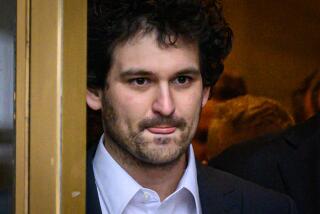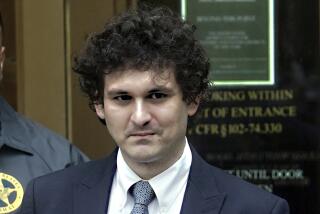Clausen Flatly Bars a Friendly B of A-First Interstate Merger
SAN FRANCISCO — BankAmerica Chairman and Chief Executive A. W. Clausen on Friday flatly ruled out a friendly merger with First Interstate Bancorp--even if the smaller Los Angeles-based banking concern were to sweeten its $3.2-billion bid.
“In all candor, I don’t see it happening,” Clausen said in one of the first interviews he has given since October, when he reassumed the leadership of the beleaguered institution after five years in Washington as head of the World Bank.
“When you want to make a friendly deal,” he said, “you don’t do it through the media,” an implied criticism of First Interstate’s tactics.
During the wide-ranging interview in his 40th-floor office in BankAmerica’s headquarters tower here, the 63-year old banker also:
- Defended his strategy of selling off such “non-core” businesses as BankAmerica’s Charles Schwab & Co. discount brokerage unit to raise badly needed capital.
- Claimed that criticism of his management style during his previous tenure as head of BankAmerica during the 1970s amounted to a “bum rap.”
- Refused to predict when BankAmerica would return to the high level of profitability that it enjoyed during his last full year as chief executive officer in 1980.
- Said it was “inconceivable” that U.S. banking regulators would force banks to write down loans to countries such as Mexico that are “making a serious effort to reform their economies and improve their credit-worthiness.”
Clausen seemed realistic when discussing the problems of BankAmerica and its most important subsidiary, Bank of America. “The fact is that the bank, by almost any measure of efficiency, is an expensive provider of financial services. . . . We are overstaffed,” he said.
At least 4,000 positions in the banking company have been identified for elimination this year, he said, a staff reduction goal that increases previous projections by at least 600 people. BankAmerica cut 6,600 employees from its payroll last year, exclusive of businesses that it sold during the year.
BankAmerica posted net losses of $518 million and $337 million in 1986 and 1985, respectively, despite nearly $1 billion in gains on sales of various businesses and other assets.
Clausen said his priorities as chairman are to “stop the bleeding” and reestablish BankAmerica’s badly shattered credibility with such constituencies as its shareholders, customers, regulators, board members and employees.
“That’s what I was invited back to do,” he said.
Clausen said he could not guess the present intentions of First Interstate’s chairman, Joseph J. Pinola, who appeared in an interview with The Times last week to have left the door open for withdrawing his bid for BankAmerica.
Getting Ready to Fight
“From our standpoint,” Clausen said, “we are gearing ourselves and girding ourselves and preparing ourselves for a fight. We have got to focus on our business and also keep an eye on the fight.
“It would be better if we could put all of our energies into the turnaround,” he added.
Clausen offered no apologies for actions taken during his previous tenure at BankAmerica or for his selection of Samuel H. Armacost to replace him in 1981.
“Am I pleased with the way things turned out? Absolutely not,” he said. But he called Armacost an “outstanding” individual who had “withstood the test of fire” in every previous job he had held at the company.
And to the oft-repeated charge that Clausen’s autocratic style had driven away from BankAmerica many talented bankers--including Pinola--who might have made a difference during the 1980s, Clausen pleaded “not guilty.”
“When outstanding people want to leave to run their own show, that is a quality to be lauded,” he said.
Clausen defended the impending sale of the Schwab discount brokerage, expected to be formally announced Monday, as well as BankAmerica’s previously announced divestitures of its personal trust department and a subsidiary bank in Italy, among others.
“Our capital, because of our loan losses, needs shoring up,” he said. Such sales “are the least costly way to raise capital under the circumstances,” Clausen said.
Banca d’America e d’Italia’s annual earnings never exceeded $34 million, Clausen said, adding: “I’ll bet you and I can figure out in 45 seconds how to make more than $34 million with the $603 million we received for that company.”
Clausen also disclosed that BankAmerica plans to shed retail banking operations in Canada and Britain in the near future.
Clausen said BankAmerica’s “huge” loan loss reserve--which totaled 2.94% of outstanding loans on Dec. 31--was in part to provide for loan losses in Latin America. But he discounted speculation that banking regulators would force U.S. banks to write down loans to, say, Mexico or Brazil as long as those countries maintain efforts to reform their economies.
Such writedowns, he said “would be counterproductive.”
Clausen noted that BankAmerica’s branch network in California and in Washington state remain an awesome deposit-gathering machine and that, even in its weakened condition, the bank is liquid and is a net provider of funds to the nation’s banking system.
Recalling European-originated rumors last Sept. 16, shortly before he returned to the San Francisco banking company, that BankAmerica was about to fail, he called them “a shock, a bolt out of nowhere.”
For more than 24 hours, he said, “the phones in our trading rooms stopped ringing. We were not able to do business.” He vowed that all his energies will go into improving BankAmerica’s position so that such rumors can never recur.
More to Read
Sign up for Essential California
The most important California stories and recommendations in your inbox every morning.
You may occasionally receive promotional content from the Los Angeles Times.










